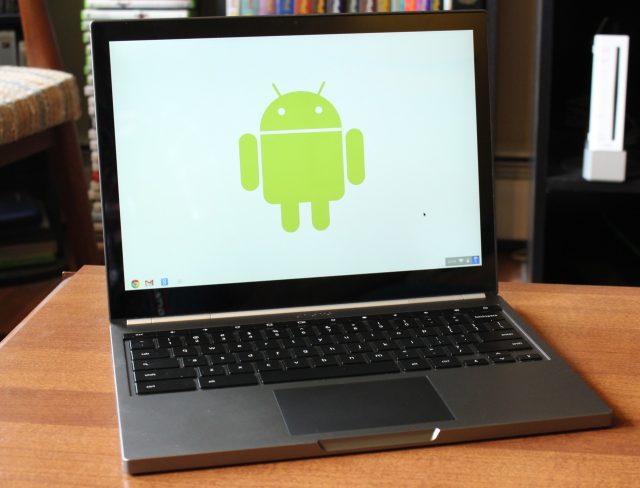
It has been almost a year since The Wall Street Journal dropped a bomb of a scoop on the Android community, saying Chrome OS would be "folded into" Android. The resulting product would reportedly bring Android to laptops and desktops. According to the paper, the internal effort to merge these two OSes had been underway for "roughly two years" (now three years) with a release planned for 2017 and an "early version" to show things off in 2016. It seems like we're still on that schedule, and now Android Police claims to have details on the new operating system—and its first launch device—coming Q3 2017.
First up, we've got a host of new code names to throw at you. The hybrid OS is apparently called "Andromeda." Besides being the name of a galaxy, it's probably meant as a geeky portmanteau of "Android" and "Chrome." Google also has a launch device cooking for Andromeda, which is officially codenamed "Bison"—Android Police says this is the unofficial codename of "Pixel 3." "Pixel 3" is a reference to the "Chromebook Pixel" (Google's flagship laptop line for Chrome OS), but since this edition isn't running Chrome OS, you can't really call it a "Chromebook" anymore.We've seen Android and Chrome OS slowly come together in various ways recently, with Chrome OS gaining the ability to run Android apps and Android snagging Chrome OS' dual partition update system. It's easy to see the hybrid OS reports as an overhyped version of these products, but Android Police says Andromeda is a "completely distinct effort" from what is currently public. "Andromeda is a much larger, more ambitious initiative that is being pursued via merging Chrome features into Android not vice versa" the report says. "It would be more accurate to say Bison [AKA the Pixel 3 laptop] will run Android [rather] than Chrome OS."
Android Police also has a spec list, which it says is "very much subject to change." Even still, these figures provide an idea of what Google is planning. Bison is a 12.3-inch convertible laptop, but the report isn't sure if that means a Microsoft Surface Book-style detachable screen or a Lenovo Yoga-style fold-over keyboard. Internally, according to Android Police, there will be "an Intel m3 or i5 Core processor with 32 or 128GB of storage and 8 or 16GB of RAM," and the competing specs suggest the device will come in multiple configurations. For ports and extras, there are supposedly two USB-C ports, a 3.5mm jack, a fingerprint sensor, stereo speakers, quad microphones, a backlit keyboard, and a glass trackpad. The report claims the device is 10mm thick and will support a Wacom stylus, which will be sold separately.
The supposed release date for the Pixel 3 lines up nicely with the original Wall Street Journal report: Q3 2017. Android Police says it will start at $799.
We announced the 1st version of Android 8 years ago today. I have a feeling 8 years from now we'll be talking about Oct 4, 2016.
— Hiroshi Lockheimer (@lockheimer) September 24, 2016
Again, that Wall Street Journal report from a year ago promised an "early version" of the merged OS for 2016. A year is a long time, and plans might have changed, but Google's October 4 event is sounding like a good place for a sneak peek.
Hiroshi Lockheimer, Google's SVP of Android, Chrome OS, and Google Play, has been hyping up Google's upcoming event in the strongest possible terms. He says we'll be talking about Google's October 4 event eight years from now—basically promising an event of historical significance. The event promises to see the unveiling of Google's Pixel phones, and rumors indicate we'll also see the launch of Google's new hardware product line, including Google Home, a "Google Wi-Fi" router, a 4K Chromecast, and a "Daydream" VR headset.
Other than Google Home and the VR headset, these are all yearly updates to products Google currently makes (some with new brand names). That collection would not live up to the "historically significant" benchmark set by Lockheimer's tweet. Executives overhype things all the time, of course. But if you're looking for an event that would be on the same scale as the launch of Android, the launch of another new OS from Google certainly fits the bill.
reader comments
69